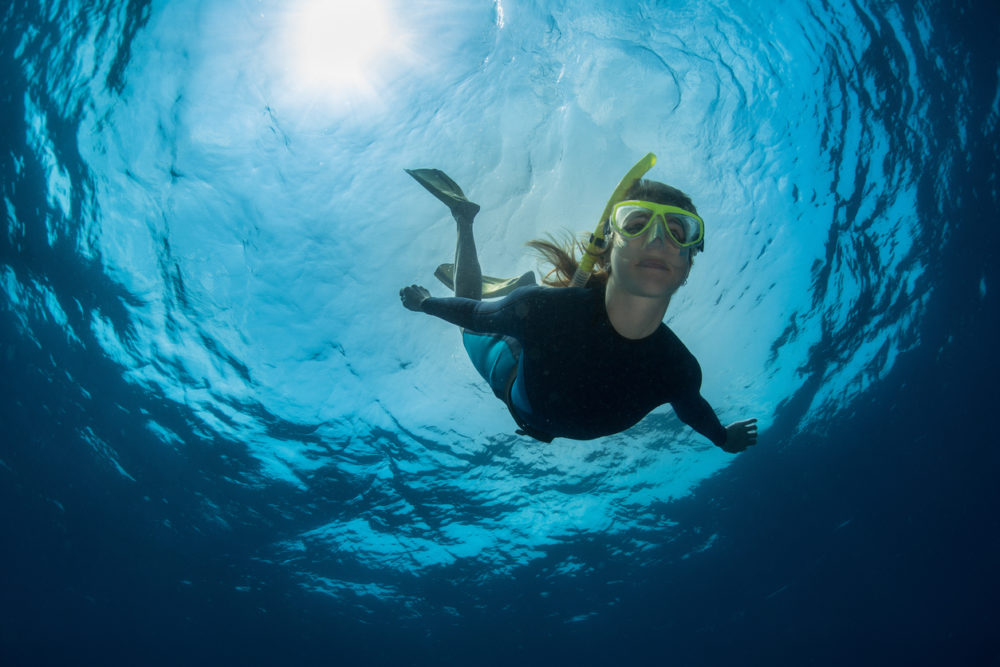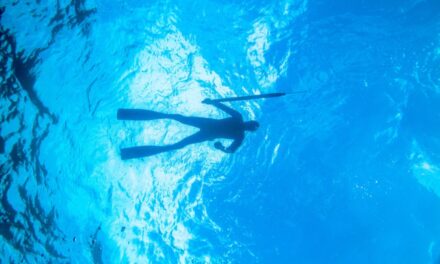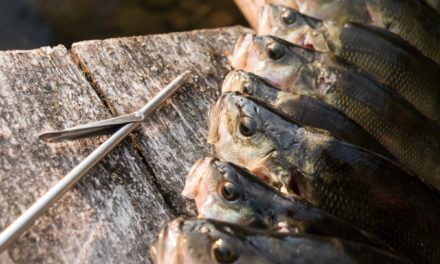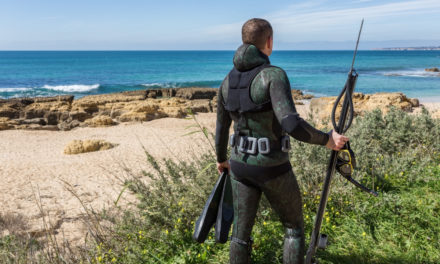Why Do My Ears Hurt When I Dive Deep Underwater?
Before we dig into freediving, let’s look at why our ears hurt when submerging our bodies underwater. At the surface–on land–our bodies experience 14.5 pounds of pressure per square inch. We don’t feel this pressure because the fluids in our body are pushing out with the same force.
You may ask yourself, “Self, how do other animals survive at deep depths?” This is a good question and it has to do with how their bodies are made. Human bodies are very rigid and stiff. A sea creatures body is very flexible and forgiving. A whale, for example, has cartilage surrounding the structure of their body. This allows their body to contract without damaging anything internally.
Humans have air pockets in their body, especially in their skulls. The nasal cavities, ear canals, and eye sockets all contain pockets of air that allow you to regulate the pressure in your daily life. You’ll have noticed this if you’ve ever flown or driven over a mountain pass. You’ll feel the pressure in your sinuses and ears and have probably developed your own method of relieving this pressure.
What is Freediving?
If you’re here at this blog, you probably know a little about freediving but if you don’t, here is a brief explanation of this exciting sport.
Freediving, also known as skin diving, is a type of underwater diving in which a person holds their breath and dives rather than strapping on a scuba tank. This requires immense skill and involves many safety precautions to perform properly.
The limits to this form of diving compared to scuba is you’re limited by how long you can hold your breath and how your body responds to the physiological changes within as you dive deeper.
There are some incredible records that have been set when it comes to freediving. The world record for the deepest free dive ever comes from Austrian diver Herbert Nitsch, the “deepest man on Earth”. In 2012, he dove, without a tank, 253 meters or 831 feet below the surface. He has a total of 33 different world records in freediving. The record for the longest a person has held their breath in a free dive was set by Stig Severinsen with a time of 22 minutes after inhaling pure oxygen. Take a look at this video for more information – click here.
How Do the Professionals Keep Their Ears From Hurting?
The thing that separates professional freedivers from amateur freedivers–aside from experience–is the ability to equalize pressure while diving. This is an essential skill of the utmost importance when participating in the sport.
Freedivers also use their expanded experience to fine tune their equalization ability. Everyone’s body is different and the techniques used to equalize vary from person to person. Professional freedivers have learned the exact method that equalizes the pressure in their heads before they dive. It may be a combination of techniques or they’ve perfected a particular method.
What Are the Different Techniques I Can Use?
There are many different techniques you can use to equalize pressure when diving. We’re going to look at the three most common methods, also called maneuvers, that freedivers use to equalize pressure before diving.
The Frenzel Maneuver?
A major benefit to the Frenzel Maneuver is that you can keep performing the technique up to 85 meters deep. Created by Herman Frenzel during World War II, the best way to describe the maneuver is to close the vocal cords like you’re about to lift a heavy weight.
To perform the Frenzel Maneuver:
- Pinch your nose with your fingers.
- Fill your mouth with a little bit of air.
- Close the epiglottis–the flap at the base of your tongue at the back of your mouth.
- Make sure the soft palate inside your mouth (the upper soft area at the back of the throat) is in the neutral position and not shifting air around.
- Using your tongue as a piston, you’re going to fire air towards the back of your throat.
If it doesn’t work immediately, don’t worry. This takes time and practice and you can do this at any time or at any place. The process may be repeated many times to achieve the desired results.
The Valsalva Maneuver?
The Valsalva Maneuver may be one that you remember from your childhood and continue to practice today. Named for Antonio Valsalva, who was the first to study the pressurization of the middle ear all the way back in the 1700s. This is one of the most popular and successful ways to equalize pressure before freediving. The technique is only effective up to 30 meters, however, so there are limitations.
To perform the Valsalva Maneuver:
- Using your thumb and forefinger, pinch your nose cavity closed.
- Attempt to exhale with force through your nose as if it were opened.
- Listen for a “clak” sound from the inside of your ear canal.
- Repeat underwater until pressure is relieved.
The Mask equalization Maneuver?
If wearing a dive mask, there is another popular way to equalize pressure. This type of freediving carries its own challenges. The mask is another place where air can get trapped and put added pressure on the skull and its air-filled pockets. This technique equalizes the pressure in the mask, thereby relieving the stresses placed while diving.
To perform the Mask Equalization Maneuver:
- Be sure your mask has a nose pocket before diving.
- Blow a small blast of air into the nose pocket with the mask on while underwater.
That’s it, mask equalization is one simple step but can be tricky to master. Air can leak out of the mask bringing the pressure back. It also uses lung power so expending this energy to equalize limits how long you can dive.
Are There Any Other Safety Tips I Need To Know About?
The most important rules of freediving are to never go into the water alone and equalize before your ears start to hurt. The first rule is pretty self-explanatory. You don’t want to get stuck in the water without a buddy or friend on the boat or shore. You may get lost, something could happen in the water, or an incident may occur topside. It’s always best to have multiple people on a dive looking out for each other.
When it comes to your ears hurting and freediving, it’s extremely important that you equalize the pressure before you begin to experience pain in your sinuses or ears. If you don’t equalize and begin to feel pressure in these sensitive areas, abandon your dive and return to the surface. Injuries including rupture of the eardrum and a squeezing of the skull are possible if you continue to dive deeper.
Pay attention to your body as it will tell you what it’s experiencing. Always play it safe.
Freediving is a sport that has been around for centuries. It may seem a little intimidating when you see it at first. Wondering how these people can dive down without oxygen and stay underwater for 5 minutes or more. They’re not superheroes and what they do is achievable by anyone. All you have to do is follow the guide above, choose your desired equalization method, and learn to hold your breath for a period of time.




![A Guide To Freediving Gear [For The Beginner]](https://spearoscout.com/wp-content/uploads/2019/03/Spearfishing-freedivng-440x264.jpg)

